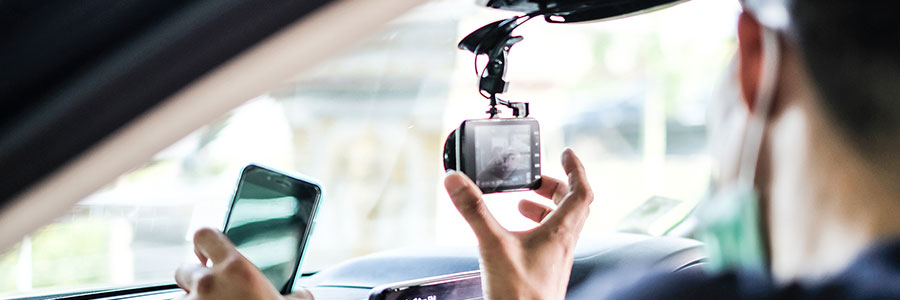Dash cams: what you need to know

There's one way to protect yourself from ‘fake' scam accidents or claims that an accident was your fault when it clearly wasn't: and that's camera footage. We're talking dash cams here.
Dash cams offer security for many drivers. They have been popular with fleets for a number of years. But until recently their high cost has put them beyond the reach for most motorists.
A surge in popularity and big steps in technology have led to a price drop, and a reduction in size, so they are now more readily affordable. If you fit them properly, they won't impede your visibility, either.
Insurers particularly like dash cams because of the clear information they provide. They can also make you feel safer in the car, guarding against dangerous drivers, road rage incidents, and ‘crash-for-cash' scams.
So what should you know before fitting a dash cam. Fortunately, our friends at GEM, a road recovery and road safety organisation, has prepared a selection of questions and answers relating to fitting and using a dash cam.
What is a dash cam?
A dash cam is a video camera that is mounted on the dashboard or windscreen of a car. Generally powered by the car's 12v system, it continuously records the view of the road and traffic through the windscreen.
How does it store footage?
Typically a dash cam continuously records video footage either on an internal memory or a removable card (such as an SD card). When the memory fills, the camera automatically overwrites the oldest files. So you should be able to set it up then leave it until you need it.
Do I have to tell others that I'm using a dash cam to record?
No. In the UK, if the car is yours and you are not using it for business (such as taxi work), it is legal to use one without notifying anyone else that you're recording.
How many are in use in the UK?
Latest estimates suggest around one in five vehicles now use a dash cam.
Where's the best place to fit it?
Fit your dashcam in the centre of your windscreen, behind the rear view mirror. Ensure it does not obstruct your forward vision.
What are the advantages of a dash cam?
As fraudulent insurance claims increase, a dash cam provides vital evidence of what actually happened and who may have been involved. Following a collision or incident on the road, a driver's memory of events or the position and action of other motorists can sometimes be unclear, while a dishonest motorist may be less likely to pursue a claim knowing that video evidence is available.
Can I save on insurance?
The installation of a dash cam could see a discount from some insurance companies, so it is always worth asking what they can offer. By the way, you don't have to tell your insurer you're using a dash cam, as it is not considered a vehicle modification.
Can I share my footage with the police?
Yes. You can upload your footage to any police force in England and Wales using the National Dash Cam Safety Portal. There have been plans for a Police Scotland portal but these remain under review.
What sort of offences would be suitable?
Dash cam submissions showing dangerous driving, driving without due care and attention, using a mobile phone, not wearing a seat belt, contravening a red traffic light, contravening solid white lines and other offences where the driver is clearly not in proper control of the vehicle.
Would I need to go to court?
The typical process is that you complete a ‘statement' when you upload your footage. This involves answering a few pre-formatted questions. Estimates suggest that fewer than two per cent of people submitting dash cam footage have to attend court. However, if you are not prepared for the possibility of attending court, then you should not submit the footage.
Could the footage recorded on my dash cam be used against me?
Yes. If you're involved in a collision, or are stopped by the police for committing an offence, then officers could seize your dash cam or could require you to present its footage for them to review.
GEM chief executive Neil Worth offers this advice on fitting dash cams and making roads safer:
“Fitting a dash cam is a good move for road safety,” he says. “Once installed, it's good to know it can protect you in incidents where it might otherwise be your word against someone else's.
“But however helpful a dash cam may occasionally be, we still encourage everyone to drive with care, courtesy and concentration. These cost nothing, and if every driver committed to upholding them, then we would see a significant and sustained reduction in the number of people killed and seriously injured on our roads.”
View our latest blog posts

Categories
Pages
We are a family run business based in rural Worcestershire. Our team of 38 staff are on hand to provide an exceptional service to personal and business customers.
Read More
